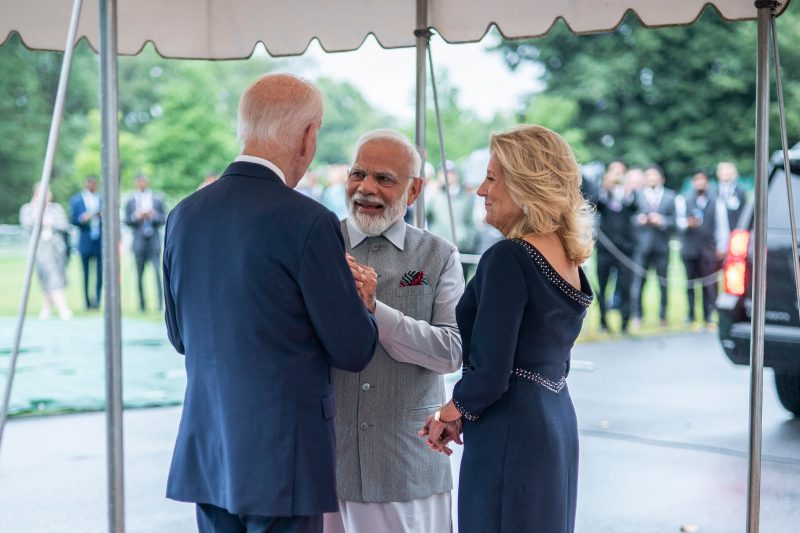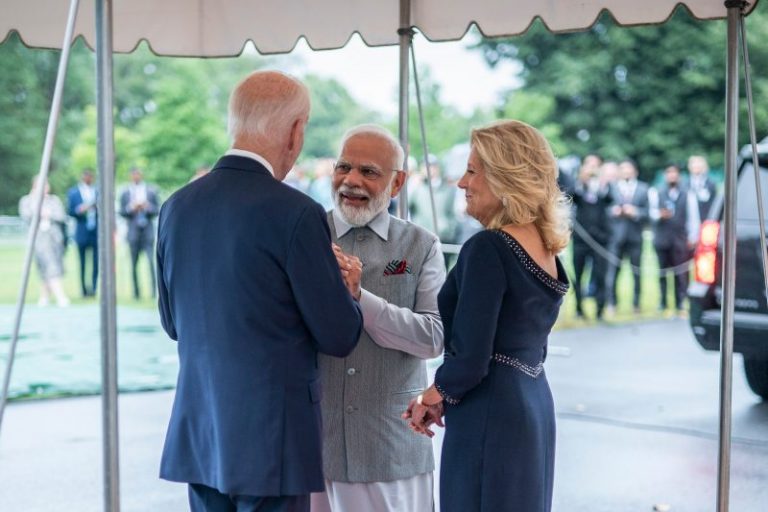
President Biden used a state visit by Prime Minister Narendra Modi on Thursday to publicly defend India’s democratic values while doubling down on his criticism of China, praising an Indian leader who has been widely accused of overseeing a series of repressive moves in his country.
Asked about allegations by human rights groups that Modi’s government has cracked down on dissent and targeted religious minorities, Biden drew a sharp contrast between India and China, whose leader he recently characterized as a dictator.
“One of the fundamental reasons that I believe the U.S.-China relationship is not in a space as it is with the U.S.-India relationship is that there’s an overwhelming respect for each other because we’re both democracies,” Biden said. “And it’s a common democratic character of both our countries and our people — our diversity; our culture; our open, tolerant, robust debate.”
Modi, addressing reporters alongside Biden, seized on the president’s comment that democracy is in the “DNA” of both America and India, saying that in his country’s values, “there’s absolutely no discrimination, neither on basis of caste, creed, or age, or any kind of geographic location.”
Biden declined to soften his description earlier this week of Chinese leader Xi Jinping as a dictator, saying he would not be “avoiding what I think is the facts” about the U.S.-China relationship. Dismissing what he called “hysteria” about tensions between Washington and Beijing, Biden said he plans to meet with Xi soon and that he did not think his comment “had any real consequence.”
Podcast episode
Most human rights groups view China as a repressive authoritarian state, while India is seen as a flawed democracy whose leaders are making increasingly troubling moves. The United States urgently wants India as an ally against China, and Biden’s decision to lavish praise on Modi reflects the complexities behind his frequent depiction of a worldwide struggle between democracy and autocracy.
White House aides said Biden’s high-level engagement with Modi during the state visit — a mixture of intricate pageantry and substantive agreements on technology, diplomacy and defense — reflected India’s increasingly prominent role in global affairs and Washington’s desire to boost ties with the world’s most populous nation.
Modi is seeking to bolster his country’s global standing, which White House officials say could in turn benefit U.S. interests. Modi joined Biden for a meeting in the Oval Office, addressed a joint meeting of Congress and attended a state dinner. He is scheduled to have lunch with Vice President Harris and Secretary of State Antony Blinken on Friday.
In his address to Congress, Modi appeared to bolster Biden’s view of China without mentioning the country by name, saying that “the dark shadows of coercion and confrontation are casting their shadow in the Indo-Pacific.”
In contrast, he did not condemn Russia’s invasion of Ukraine as U.S. officials want him to, saying only, “I now say directly and publicly: This is not an era of war, but it is one of dialogue and democracy. And we all must do what we can to stop the bloodshed and human suffering.”
Modi’s trip to Washington was just the third official state visit of Biden’s presidency, following similar honors for French President Emmanuel Macron and South Korean President Yoon Suk Yeol. Modi, who also addressed U.S. lawmakers in 2016, is one of only a handful of world leaders who have been invited twice to address a joint meeting of Congress.
Modi repeatedly referred to India as a robust democracy during his speech, seemingly an implicit response to the criticism.
“Being a citizen of a vibrant democracy myself, I can admit one thing: Mr. Speaker, you have a tough job,” Modi said, turning to House Speaker Kevin McCarthy (R-Calif.). “I can relate to the battles of passion, persuasion and policy. I can understand the debate of ideas and ideology. But I’m delighted to see you come together today to celebrate the bond between the world’s two great democracies — India and the United States.”
Lawmakers from both sides of the aisle rose repeatedly to applaud, while visitors in the House gallery chanted, “Modi! Modi!” Earlier, during a raucous arrival ceremony with thousands of chanting supporters, Biden hailed Modi and touted the “limitless possibilities” of the U.S.-India relationship.
“Two great nations, two great friends, two great powers that can define the course of the 21st century,” Biden said.
Biden and Modi announced several agreements, including a deal to jointly produce a GE fighter jet engine in India and efforts to shore up supply chains for microchips and other key technologies. They also announced that the United States will open new consulates in Bangalore and Ahmedabad, while India will open a new consulate in Seattle.
The comparison between India and China arose in part because of an informal comment Biden made earlier this week about Xi.
Speaking at a fundraiser in California, Biden made what appeared to be an off-the-cuff comment about America’s downing in February of a suspected Chinese surveillance balloon, suggesting that Xi had been kept in the dark about it by his own government. “That’s what’s a great embarrassment for dictators — when they didn’t know what happened,” Biden said.
China reacted angrily to that characterization of its leader, calling it “extremely absurd and irresponsible,” but the White House has not backed away from it.
On Thursday, Modi spoke to a Congress that now includes five Indian Americans, while a vice president of Indian descent sat behind him, creating a striking tableau that Modi did not fail to note. “There are millions here who have roots in India, some of them sitting probably in this chamber — and there is one behind me, too,” Modi said. “I’m told the samosa caucus is now the flavor of the House. I hope it grows and brings the full diversity of Indian cuisine here.”
While Biden told reporters that he had discussed human rights and democracy in his private meeting with Modi — saying the United States and India both face “challenges” on those fronts — he did not publicly address the concerns of human rights groups, lawmakers and others who called on the president to take a more aggressive stance.
The organization Human Rights Watch, for example, says that Indian authorities “prosecute activists, journalists, peaceful protesters, and other critics on fabricated counterterrorism and hate speech laws.” Modi’s government, it adds, “has adopted laws and policies that discriminate against religious minorities, especially Muslims.”
Activists also cite a proliferation of bigoted rhetoric and attacks on freedom of speech since Modi’s rise to power in 2014, which they say has emboldened Hindu-nationalist groups to act with impunity. The U.S. State Department has also highlighted these developments in reports and statements, saying the situation has grown worse in recent years.
Modi denied that anti-democratic trends are widespread in India and said he was surprised that critics were even raising these issues, given his country’s democratic character. India, he said, has proved that “democracy can deliver,” adding, “when I say deliver, this is regardless of caste, creed, religion, gender.”
Before Modi’s arrival, more than 70 members of Congress urged Biden to use the meeting with the prime minister to address political violence, internet shutdowns, restrictions on press freedom and other “troubling signs” in the world’s largest democracy.
“As longtime supporters of a strong U.S.-India relationship, we also believe that friends can and should discuss their differences in an honest and forthright way,” the lawmakers wrote. “That is why we respectfully request that — in addition to the many areas of shared interests between India and the U.S. — you also raise directly with Prime Minister Modi areas of concern.”
Some lawmakers, including Reps. Ilhan Omar (D-Minn.) and Rashida Tlaib (D-Mich.), both Muslims, boycotted Modi’s speech to Congress.
A small crowd of demonstrators protested Modi’s visit near the Capitol on Thursday, some holding signs that read, “Religious freedom: All lives in India matter” and “U.S. supporting killer Modi.”
“He’s trying to transform India into a Hindu nation,” said Sheena Sood, 38, who traveled from Philadelphia. “I’m here because we have to resist whenever there is an authoritarian leader who has a fascist’s agenda but claims it’s a secular democracy.”
Daniel Markey, a senior adviser at the U.S. Institute of Peace and a former State Department official, said it’s important for Washington to cultivate closer ties to India, but he criticized former president Donald Trump — and now Biden — for lavishing praise on Modi personally.
“It was bad enough with a Trump administration that didn’t seem to care at all about democratic values, but there’s now an even deeper dissonance with a Biden administration that has said democracy should be at the core of how it makes foreign policy,” Markey said.
Jake Sullivan, Biden’s national security adviser, said that Biden always brings up human rights and democracy in meetings with foreign leaders and that this visit would be no different. At the same time, he said, there is limited value in the United States trying to lecture Modi on the importance of democratic principles.
“As countries, as societies, as polities, my personal view is the best way to do that is to have candid, robust discussion not just between our governments, but between our civil societies, between our activists, between our journalists,” Sullivan said.
In the lead-up to the visit, U.S. officials had lobbied the Modi government to agree to participate in the joint news conference, something the Indian leader has not done in years, officials said. On Wednesday, the White House announced that Modi and Biden would indeed take questions from reporters.
But it was hardly a freewheeling give-and-take. Only two reporters, one from the U.S. press corps and one from the Indian press corps, were allowed to ask questions of the leaders.
Mariana Alfaro and Samantha Latson contributed to this report.


Comments are closed.